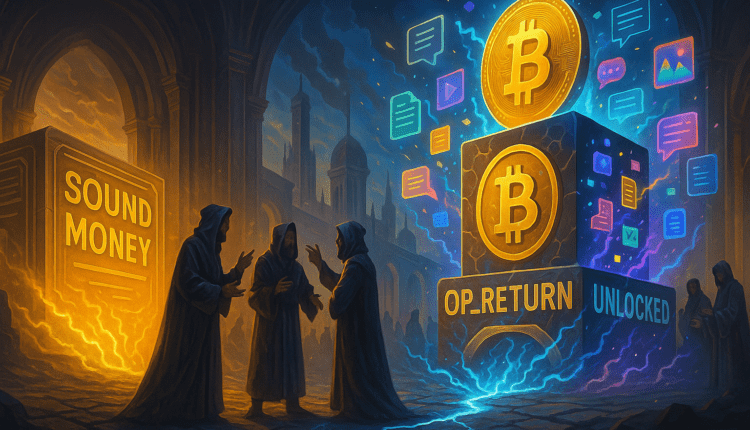Bitcoin Identity Crisis: Devs Clash Over OP_RETURN Proposal and Blockchain Data Expansion

A proposal to remove Bitcoin OP_RETURN data limits has split the developer community, raising questions about Bitcoin identity and use case beyond financial transactions.
Bitcoin Developers Clash Over Proposal That Could Redefine the Network’s Purpose
A heated debate has erupted in the Bitcoin community over a technical proposal that some claim could fundamentally alter the very soul of the world’s most established cryptocurrency.
Online advertising service 1lx.online
The controversy centers on a suggestion to remove current limitations on the OP_RETURN function—a script opcode that enables users to store non-financial data directly on the Bitcoin blockchain. As it stands, Bitcoin restricts this to 83-byte chunks, enough for a short note or metadata.
However, the proposed change would lift those constraints, allowing users to embed significantly larger data sets—text, images, documents—within Bitcoin transactions, up to the existing transaction cap of 100 kilobytes.
The Argument for Change
The proposal was spearheaded by long-time Bitcoin developer Peter Todd, who argued that the restrictions are effectively obsolete. According to Todd, many users are already skirting the limits via technical workarounds, making the current rule not only redundant but counterproductive.
“Bitcoin Core shouldn’t maintain arbitrary limits that are ineffective and even harmful,” he stated, suggesting that removing the cap would make the system more transparent and manageable.
The Pushback
Not everyone is on board. Jason Hughes, another veteran Bitcoin Core contributor, strongly criticized the proposal, calling it a “fundamental change to the nature of what the Bitcoin network is in its entirety.”
He warns that turning Bitcoin into a platform for broader data storage dilutes its core mission as a peer-to-peer monetary system. On X (formerly Twitter), Hughes posted a scathing comment:
“Bitcoin Core developers are about to merge a change that turns Bitcoin into a worthless altcoin, and no one seems to care to do anything about it.”
Online advertising service 1lx.online
Wider Implications
While some developers believe the change could pave the way for innovative use cases—such as NFTs, on-chain messaging, or decentralized publishing—critics argue it introduces risks. One concern is that non-financial data could flood the network, congesting block space and driving up transaction fees.
Bitcoin Core maintainer Pieter Wuille, though generally supportive of the proposal, acknowledged its scale. “This is not a trivial change. It does carry long-term implications and deserves careful scrutiny,” he said.
What’s Next?
As of now, the proposal has not been formally merged into the Bitcoin Core codebase. The community is watching closely, with debates intensifying in development mailing lists, forums, and social media channels.
Online advertising service 1lx.online
This moment underscores a deeper question: Is Bitcoin a strict monetary system, or should it evolve into a broader decentralized data protocol?
The answer could shape the future of the network—and possibly its value proposition—for years to come.
Our creator. creates amazing NFT collections!
Support the editors - Bitcoin_Man (ETH) / Bitcoin_Man (TON)
Pi Network (Guide)is a new digital currency developed by Stanford PhDs with over 55 million participants worldwide. To get your Pi, follow this link https://minepi.com/Tsybko and use my username (Tsybko) as the invite code.
Binance: Use this link to sign up and get $100 free and 10% off your first months Binance Futures fees (Terms and Conditions).
Bitget: Use this link Use the Rewards Center and win up to 5027 USDT!(Review)
Bybit: Use this link (all possible discounts on commissions and bonuses up to $30,030 included) If you register through the application, then at the time of registration simply enter in the reference: WB8XZ4 - (manual)
